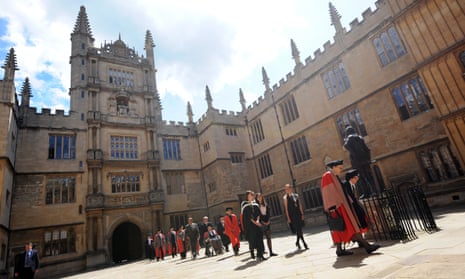Philanthropic donations to UK universities have exceeded £1bn a year for the first time, according to a new survey.
The Ross-Case survey of higher education, carried out by the Council for Advancement and Support of Education (Case) Europe, showed that the total amount of philanthropic income secured in new funds by 110 participating universities has gone up by 23% in the space of a year.
Those working to increase philanthropic giving in UK higher education say the £1.06bn total for 2015-16 marks a significant landmark and shows that philanthropy now represents an important income stream for UK universities.
Case global vice president Tricia King said: “Philanthropic giving is now at the heart of UK university culture.
“It provides vital funds to enable the nation’s universities to invest in new ground breaking research that pushes back the boundaries of knowledge, improves social mobility by widening access to degree study and builds world class facilities.”
The universities of Oxford and Cambridge remain the biggest winners from charitable giving by a huge margin however. Together they account for 46% of new funds secured and 34% of total donors.
Though dwarfed by the enormous donations US universities receive – $40.3bn (£31.1bn) in 2015 – the £1bn total marks an important milestone in philanthropic giving in the UK since the survey began 15 years ago and comes at a time of growing uncertainty in the sector about the impact of the Brexit vote on university funding.
Responding to the survey, Sally Hunt – general secretary of the University and College Union, which represents university staff – called for greater public investment rather than a growing dependence on donations.
“Higher education is worth paying for, and UCU remains committed to campaigning for greater public investment rather than asking others to make up shortfalls,” she said.
“As we try to deal with the Brexit fallout, the sector needs stability at the moment and that comes via secure funding, not variable streams. The universities benefitting from the larger donations are the wealthier ones, so the system entrenches inequality.”
The government has been encouraging universities to diversify their funding streams for many years. One of the explanations for the large increase in pledges this year is that universities have been cultivating relationships with donors over time and they are now prepared to give more. As a result there has been a 27% increase in the number of donors pledging gifts worth £500,000 or more, up from 189 to 240.
The increase in secured funds comes despite a slight decrease (0.5%) in the overall number of donors year on year, thanks to larger gifts and pledges. New funds secured from alumni (£322m) account for significantly more than non-alumni individuals (£149m); new funds secured from trusts and foundations (£442m) outweighs those from companies (£82m).
Universities are, however, spending more in order to raise more. In 2015-16 investment in fundraising was up 16% and up 10% in alumni relations on the previous year.
Donations have been used to pay for the development of a genetic test to improve childhood cancer treatment at the Institute of Cancer Research; dementia research at the University of Edinburgh; new scholarships to enable Londoners from disadvantaged backgrounds to study at the University of London and students from Rwanda, Tanzania and Uganda to study a master’s degree at the University of Manchester.
Prof Sir David Greenaway, vice-chancellor the University of Nottingham and Case (Europe) chair, added: “Between 2000 and 2005 total new funds secured were just over £1bn. We are now raising in one year what used to take us five years.”
Dame Julia Goodfellow, president of the UK higher education sector umbrella body, Universities UK, and vice-chancellor of the University of Kent, said philanthropic giving now represented an important income stream for universities.
“This extra money is making a real difference, helping to fund ground-breaking research, improving facilities and supporting thousands of students through university.”
Universities UK and Case are jointly developing new guidance to universities on fundraising regulation to be published later this year.

Comments (…)
Sign in or create your Guardian account to join the discussion